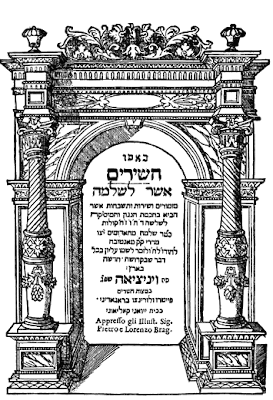By Greg Stepanich
WEST PALM BEACH — The moment of true cultural collision for Seraphic Fire’s latest concert came in the middle of a hot Thursday afternoon, as a cantor rolled melismatically over words of praise to the Most High while choristers in the balconies above held a drone and let him have his say.
But the music that came before, and was wrapped around it, was the late Renaissance-early Baroque writing of Salamone Rossi (1570-1630), the most important Jewish composer of art music before the 19th century, and a member of the Mantuan court of Duke Vincenzo I Gonzaga. Rossi also was a colleague of the music master there, Claudio Monteverdi, and works by the two composers constituted Seraphic Fire’s program Thursday at the Harriet Himmel Theater in West Palm Beach’s CityPlace.
Director Patrick Dupre Quigley, who has just finished recording Monteverdi’s Vespers of 1610 with his group and the Western Michigan University Chorale, offered sacred works by Monteverdi (in Latin) and Rossi (in Hebrew) as well as four secular pieces by Rossi, on a program Quigley called The Jew and the Gentile. The result was enlightening, moving, and ultimately absorbing: here was music from a fascinating time, full of color, beauty and innovation.
The 13-member chorus showed throughout the concert one of the chief reasons for its praiseworthiness, which is its exceptional polish and accuracy in this quite difficult music, writing that doesn’t offer a big tonal wash to cover up vocal deficiencies. Rather, each line, and even each syllable, are precisely crafted and can alter their shading instantly with one change of a note. Music like that sounds bizarre to modern ears unless its performers can pinpoint each of their notes, and happily, Seraphic Fire is able to do that regularly.
Monteverdi, much more than Rossi, was a composer of great rhythmic variety who changed time signatures on a dime, and here, too, the choir had clearly been carefully drilled, making the most of moments such as the sudden pulse shift at the words Fecit potentiam in brachio suo, in one of the composer’s earlier settings of the Magnificat. That work received an absolutely admirable performance in which all the liveliness of Monteverdi’s style was brought forth by lovely singing, tight ensemble, and a palpable feeling of involvement with the joyful text.
Thursday’s concert, the first of four in the group’s seasonal finale, was also a voyage of discovery for the music of Rossi. The evidence of the seven pieces played and sung here is that he was a most able composer, a writer of elegance and taste whose music deserves to be far better known. He did not have the breadth of Monteverdi nor his variety, but few composers did, and that is scant reason for his neglect on concert programs.
In addition to three Jewish religious works from his Songs of Solomon collection, Rossi was also represented by two solo-voice madrigals.
The first, Parlo, misero, o taccio? was sung by tenor Derek Chester, accompanied by an excellent four-piece instrumental ensemble of two violins, cello and organ. Chester has a strong, clear voice, and he put some real feeling into the poor-me lyrics of the song. Abigail Haynes Lennox, who has a smallish, pleasant soprano voice, had some trouble with Udite, lacrimosi, the other Rossi madrigal, wobbling at a couple moments of the moody piece. But her singing also had a lightness that enabled her to put the chatty text across effectively.
The ensemble — violinists Michael Albert and Dan Golleher, cellist Brian Howard and organist Henry Lebedinsky — played two one-movement Rossi trio sonatas, both full of high spirits and blizzards of rapid notes in the violins, which Albert and Golleher dispatched with aplomb.
The most intriguing music came from Rossi’s three religious pieces, which included Keter yittenu lakh, for which cantor George Mordecai of Miami Beach’s Temple Emanu-El guested, singing on the main floor of the Himmel while the choir in the lofts fulfilled the call-and-response function. Mordecai’s keening, nasal sound made a compelling contrast to the artful smoothness of the rest of the piece, and it was there that the worlds of art and religion really came together, the two challenging and supporting one another in powerful fashion.
The next work, ‘Eftah na sefatai, did, as promised, evoke the music of the younger Gabrieli, and the third, Yitgaddai veyitkaddash, was a sweet, wistful piece for the higher voices, answered by simple Amens in the lower. Quigley paired the Yitgaddai with the Monteverdi Magnificat, pointing to their similar texts.
The three additional Monteverdi sacred works on the program — Beatus vir, Laudate Dominum, and Dixit Dominus — each received exemplary, almost swinging performances, in particular the catchy Beatus vir, which opened the concert in genial, open-hearted fashion.
Whether or not it can ever be shown how close Rossi and Monteverdi were in Mantua, or what compositional strategies each one gave to the other, this concert showed that early 17th-century Italy had a sophisticated, cultured musical sound that breathes and moves with vitality, no matter who wielded the pen that set it in motion.
Seraphic Fire’s The Jew and the Gentile can be heard at 8 p.m. Saturday at All Saints Episcopal Church in Fort Lauderdale, and at 4 p.m. Sunday at Temple Emanu-El in Miami Beach. Tickets: $35. Available at the door, by calling 305-285-9060, or visiting www.seraphicfire.org.
